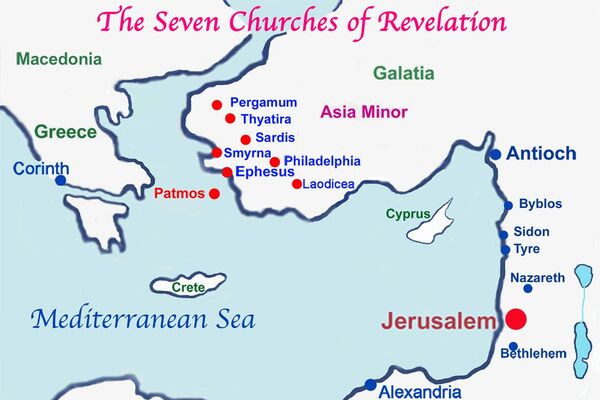Revelation 2:18-3:6
Lesson 472
Read both the "King James Bible" and the "New Living Translation."
In this lesson:
Lesson 471 continues.
Thyatira, the compromising church (2:18-29).
Sardis, the dead church (3:1-6).
Look for Jesus' praise, rebuke, warning, and promise to both churches.
This entire passage is Jesus speaking.
Lesson 471 continues.
Thyatira, the compromising church (2:18-29).
Sardis, the dead church (3:1-6).
Look for Jesus' praise, rebuke, warning, and promise to both churches.
This entire passage is Jesus speaking.
Where was -
Thyatira -
Thyatira was an important city in the Roman province of Lydia in Asia Minor (modern-day Turkey). Thyatira sat on the Lycus River forty miles south of Pergamos. It had a large, primarily Greek population. With its manufacturing and numerous trade guilds (unions), Thyatira would be considered a blue-collar town today. Its most profitable products were dyes (made from local roots), linens, and pottery. To every Christian tradesman's horror, many of the worker's guilds in Thyatira worshipped their own patron god. The church in Thyatira had its good points. It was known for its faith, love, Christian service, and patience (Revelation 2:19). But like Pergamos, Thyatira had trouble resisting false prophets, pagan rituals, and immorality (Revelation 2:20). The Bible only mentions Thyatira in Acts 16:14 and Revelation 1:11, 2:18, and 2:24.
Sardis -
Famous for its art, crafts, and dye works, the city of Sardis was located on the banks of the Pactolus River near Mount Tmolus, fifty miles east of Symrna. It was the capital of Lydia and grew rich thanks to its robust textile and jewelry industry. Although in decline by John's day, Sardis was still a well-to-do commercial center. Despite being an early center of Christianity, many of its citizens worshipped Cybele, the pagan goddess of nature. By the time Jesus dictated His letter to the Sardis church, it was spiritually dead (3:1). The Bible only mentions Sardis in this passage. The city no longer exists, but its ruins have been well explored. An archelogy team from Princeton University uncovered the ruins of a fourth-century AD Christian church and a temple honoring Cybele that dates back 2400 years.
Thyatira -
Thyatira was an important city in the Roman province of Lydia in Asia Minor (modern-day Turkey). Thyatira sat on the Lycus River forty miles south of Pergamos. It had a large, primarily Greek population. With its manufacturing and numerous trade guilds (unions), Thyatira would be considered a blue-collar town today. Its most profitable products were dyes (made from local roots), linens, and pottery. To every Christian tradesman's horror, many of the worker's guilds in Thyatira worshipped their own patron god. The church in Thyatira had its good points. It was known for its faith, love, Christian service, and patience (Revelation 2:19). But like Pergamos, Thyatira had trouble resisting false prophets, pagan rituals, and immorality (Revelation 2:20). The Bible only mentions Thyatira in Acts 16:14 and Revelation 1:11, 2:18, and 2:24.
Sardis -
Famous for its art, crafts, and dye works, the city of Sardis was located on the banks of the Pactolus River near Mount Tmolus, fifty miles east of Symrna. It was the capital of Lydia and grew rich thanks to its robust textile and jewelry industry. Although in decline by John's day, Sardis was still a well-to-do commercial center. Despite being an early center of Christianity, many of its citizens worshipped Cybele, the pagan goddess of nature. By the time Jesus dictated His letter to the Sardis church, it was spiritually dead (3:1). The Bible only mentions Sardis in this passage. The city no longer exists, but its ruins have been well explored. An archelogy team from Princeton University uncovered the ruins of a fourth-century AD Christian church and a temple honoring Cybele that dates back 2400 years.
Study Tip:
We read as if we're in a race. But slow down when reading the Bible. Take the time to meditate on each passage and allow the true meaning of God's word to enter you.
We read as if we're in a race. But slow down when reading the Bible. Take the time to meditate on each passage and allow the true meaning of God's word to enter you.












